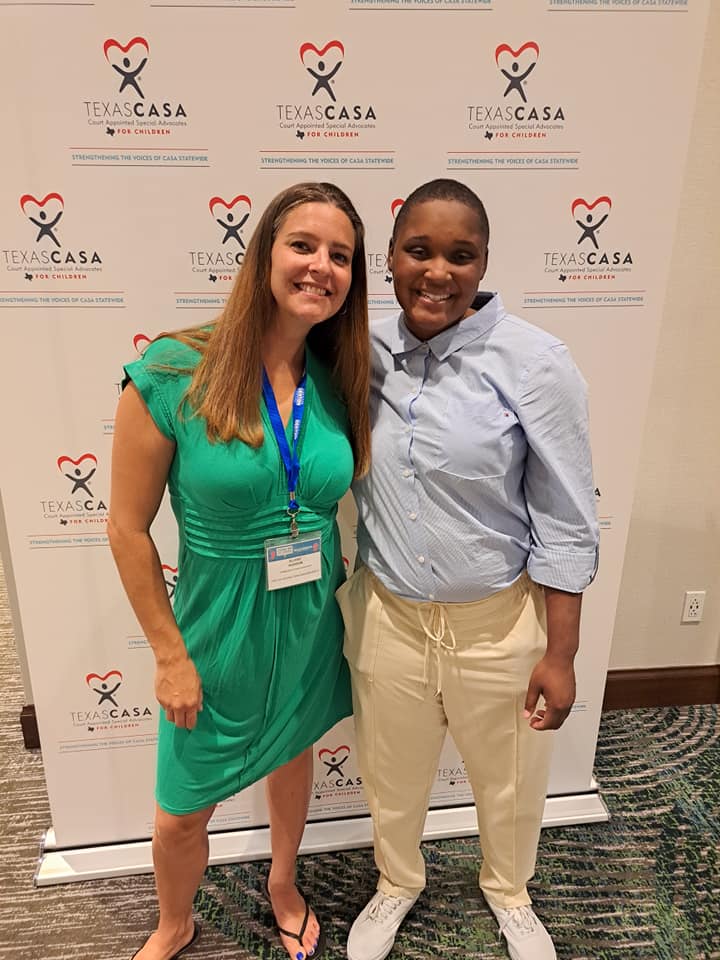Posted on August 29, 2022 by Amanda Cerreto
AUGUST 26, 2022 — Less than three percent of youth with a history of foster care earn a four-year degree and only about half graduate from high school, according to the National Foster Youth Institute.
 Ronika Allen
was determined to beat those odds. Not only did she earn an undergraduate degree, but she is now enrolled in UTSA's criminology and criminal justice program, where she is on track to graduate with her master's degree in 2023.
Ronika Allen
was determined to beat those odds. Not only did she earn an undergraduate degree, but she is now enrolled in UTSA's criminology and criminal justice program, where she is on track to graduate with her master's degree in 2023.
From the time she was seven until she aged out at 21, Allen was in and out of the foster care system. During this time, like many youth in foster care, she navigated through several placements, school systems and families.
"I honestly cannot believe how far she has come in life, but that is Ronika, always proving that she can do what she puts her mind to."
When she was 16-years-old, she lived in the Austin Children's Center. There, she realized she needed to knuckle down and get serious.
"I realized that I was going to age out soon, and all I had was myself," Allen said. “I knew I had to get to work and focus on college.”
With the help of her high school teachers, Allen was able to finish high school and enroll in Austin Community College in 2015. By the time she transferred to Texas State, she only had to complete four semesters to earn her undergraduate degree.
“It was definitely challenging, living in a shelter and trying to get into college,” Allen said. “But I was responsible about everything, and the supportive services I was getting from caseworkers and teachers made it easier.”
Her support system included Eloise Hudson , Allen's court appointed special advocate from age 12 to 16. Hudson advocated for Allen as she navigated between placements while still attending school. She would also provide a sense of normalcy for Allen, taking her out to activities and spending time with her.
“I honestly cannot believe how far she has come in life, but that is Ronika, always proving that she can do what she puts her mind to,” Hudson said. “She has had help, guidance and support along the way, but she has accomplished so much because she made the decision that she wanted a better life for herself then what was being offered.”
Recently, Allen was asked to speak at a statewide conference for the Texas Court Appointed Special Advocates (CASA). A naturally shy person, Allen was nervous, but she shared her story about her experiences in foster care and how CASA helped her through.
In addition to CASA, Allen credits the Bexar County Fostering Educational Success (BCFES) program for helping her navigate in the higher education world.
“BCFES is the first place I go to if I need support,” she said.
Generously funded and supported by the Texas Legislature, the BCFES is a UTSA-led collaboration with Texas A&M University-San Antonio, the Alamo Colleges District, the Bexar County Children's Court, and Child Advocates San Antonio. It serves as a national model for student success by developing programs and practices to guide students with a history of foster care as they navigate higher education.
UTSA First Lady, Peggy Eighmy, started the program at UTSA and sought funding from the legislature for the BCFES. She is also a board member of Texas CASA and was fortunate to hear Allen speak at the statewide conference.
“From the moment I met Ronika I knew she was very special. Her enthusiasm for life, work ethic and intellectual curiosity were so evident. It was very generous of her to share her story navigating foster care, and I was so very proud that she is a UTSA student,” said UTSA First Lady Peggy Eighmy . “Ronika is an inspiration and shining example of how hard work and perseverance, regardless of circumstance, can help young people achieve greatness.”
As Allen pursues her master's degree, she utilizes programs like the BCFES and the UTSA
Writing Center while juggling a part-time job.
“I want to be successful,” said Allen. “Going to college is one of the ways I can do that, so I am determined to finish.”
That determination is evident in her educational path. Allen began college in 2015 and enrolled every semester - including summers - to see it through. She encourages other students to adopt that same mindset.
“You have to have goals for yourself, and then have perseverance to see them through,” Allen said. “Make the goals and then wade through, no matter how long it takes.”

